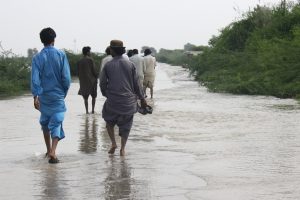Introduction:
Water scarcity is emerging as a critical component of the broader climate crisis, particularly in large Asian economies such as India and China. Experts warn that these countries will face severe water shortages due to rapid urbanization and the growing demands of industries ranging from traditional manufacturing to clean energy.
As global fresh water demand is projected to exceed supply by 40% to 50% by 2030, researchers emphasize that water scarcity is not just a sectoral issue but one that has far-reaching implications for entire economies. In this article, we delve into the implications of water scarcity in Asia and its potential impact on various sectors.
As global fresh water demand is projected to exceed supply by 40% to 50% by 2030

The Water Scarcity Challenge in Asia:
Asia, as an industrialization hub experiencing rapid rates of urbanization, faces significant challenges when it comes to water scarcity.
Arunabha Ghosh, CEO of the Council on Energy, Environment and Water, highlights that the region’s growing industries, including semiconductor manufacturing and clean energy, demand substantial amounts of water.
With global fresh water demand predicted to outstrip supply by 40% to 50% by 2030, water scarcity becomes a critical concern that transcends the entire economy.
India, with its 18% share of the world’s population, faces the highest risk of water scarcity.
India: The World’s Most Water-Stressed Country:
India, with its 18% share of the world’s population, faces the highest risk of water scarcity. The World Bank identifies India as the world’s most water-stressed country, as its water resources can only support 4% of its population.
The country heavily relies on the monsoon season, but climate change has led to increased floods, droughts, and exacerbated water shortages.
China’s Water Crisis and Industrial Dependence:
China is grappling with its own water crisis, with approximately 80% to 90% of its groundwater unfit for consumption and half of its aquifers too polluted for industrial and agricultural use.
Moreover, half of China’s river water is unfit for drinking, posing significant challenges to industries and agriculture. Despite progress in clean energy transition, China’s power system remains largely reliant on coal, which requires substantial water resources for generation.
China is grappling with its own water crisis, with approximately 80% to 90% of its groundwater unfit for consumption
Water Scarcity’s Impact on Sectors and Transition to Net-Zero:
Various sectors are heavily affected by water scarcity, such as Taiwan’s semiconductor industry, which requires significant water supplies for manufacturing processes. Water shortages can hinder supply chains and impact the production of semiconductor chips.
While many manufacturing industries require water, there is potential for water recycling rather than its outright consumption.
The lack of water availability also poses challenges to countries’ transition to net-zero emissions, as hydroelectricity generation may be impeded.
Water Scarcity and Agricultural Consequences:
Water scarcity has profound implications for agriculture, as evidenced by the expected decline in agricultural production in Australia due to drier conditions and reduced crop yields.
The growing risk to food production and the agricultural sector highlights the need to balance water availability for cities and economies while ensuring sustainability in longer periods of drought.
Conclusion:
The looming water scarcity crisis in Asia, particularly in India and China, demands urgent action to mitigate risks and ensure sustainable water management.
The challenges posed by water scarcity transcend sectors and economies, requiring regional cooperation and innovative solutions.
Governments, industries, and communities must recognize the importance of water as a common regional resource and work collectively to address this pressing issue before severe economic shocks occur.




